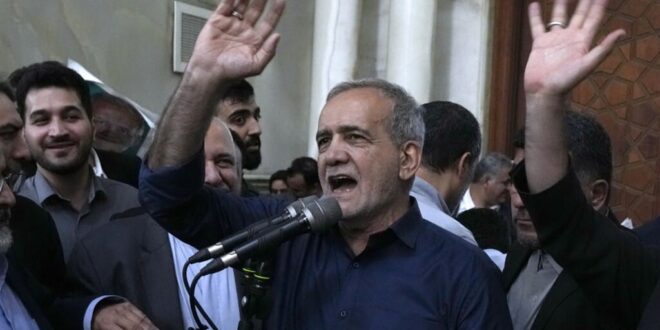Latest Developments
At least 50 percent of Iranian voters boycotted the second round of the Islamic Republic’s presidential election on July 5, which resulted in a victory for Masoud Pezeshkian, touted as a reformist candidate, against his rival Saeed Jalili, a former nuclear negotiator. According to the official count — which was not monitored by international election observers and is suspected by Iranian dissidents of having inflated the total number of votes — Pezeshkian won 53.3 percent of the vote against 44.3 percent for Jalili. By the regime’s count, turnout in the second round increased by approximately 10 percent to 49.6 percent compared with the first round on June 28, which was boycotted by at least 60 percent of eligible voters — the lowest ever turnout in an Iranian election since the 1979 seizure of power by the clerical regime. The mass stayaway highlighted deep-seated disillusionment among Iranians over a seemingly pre-ordained process controlled by Supreme Leader Ayatollah Ali Khamenei and his 12-member Guardian Council, without whose approval candidates are ineligible to run in elections. Additionally, more than 600,000 ballots were voided in July 5’s two-way contest — another sign of the rejection of both candidates by the majority of voters. On July 6, Khamenei congratulated Pezeshkian and blamed low voter turnout on a campaign “orchestrated by the enemies of the Iranian nation to induce despair and a feeling of hopelessness.”
Expert Analysis
“A Pezeshkian victory does not change the facts on the ground in Iran that we have been witnessing for almost a decade now. Iranian society has continued to embrace street protests and boycott the ballot box because of an assessment that no faction in the regime represents their views, values, or interests. Rather, Pezeshkian’s ascension represents an understanding by the regime about the need to foster two things through merely ornamental change: More debate and handwringing in Western capitals about pressure now that a so-called reformist is at the helm, and more dissonance and disunity in the Iranian opposition and diaspora over next steps.” — Behnam Ben Taleblu, FDD Senior Fellow
“The key message of the election is that the majority of Iranians boycotted it — a clear indication that they do not view the regime as legitimate and desire its downfall. Pezeshkian will reactivate former Foreign Minister Javad Zarif’s influence network in the West to bury this message and revive the reform myth.” — Saeed Ghasseminejad, Senior Iran and Financial Economics Advisor
Pezeshkian’s Support for Islamic Revolutionary Guard Corps
A cardiac surgeon by profession and a long-standing legislator, Pezeshkian served as health minister from 2001 to 2005 in the administration of former President Muhammad Khatami. Pezeshkian supports the Joint Comprehensive Plan of Action, the nuclear deal agreed in 2015 between Iran, the United States, and five other world powers. He is closely aligned with the theocracy’s ostensible “reformist” wing, alongside former Foreign Minister Mohammed Javad Zarif, a key architect of the nuclear deal, and former President Hassan Rouhani. Iran has continued work on its nuclear program. It is “the only non-nuclear armed country to enrich uranium to 60 percent, close to the 90 percent needed to build a bomb,” according to the International Atomic Energy Agency and reported by France 24.
While reportedly seeking greater understanding with Western nations, Pezeshkian underlined that any detente would not include Israel, in remarks made after he cast his vote. He is also a strong supporter of the Islamic Revolutionary Guards Corps (IRGC), designated as a terrorist organization by the United States in 2019. Following the U.S. designation, Pezeshkian appeared in public wearing an IRGC uniform, saying that “Without the IRGC, this country would have been divided, and our work would have ended.” On July 6, IRGC commander-in-chief Maj. Gen. Hossein Salami offered fulsome congratulations to Pezeshkian, trumpeting “the IRGC’s belief that the Islamic Republic will triumph in the economic battle against its adversaries through the full mobilization of national resources, opportunities, and expertise,” according to the Iranian state-run news agency IRNA.
Pezeshkian has also advocated support for Hamas, Iran’s proxy terrorist group in Gaza. He played a prominent role in the passage of a 2008 law obliging the regime to “provide all-round support to the oppressed people of Palestine.”
 Eurasia Press & News
Eurasia Press & News




